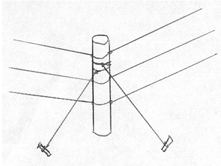
*Building Effective Fencing *
By Kingpin
Keeping your animals in, and predators out
If you intend to keep livestock, or if you just want to keep animal out of our vegetable garden, you need fencing.
A well-built fence allows you to relax, knowing that your animals will stay in the field that you put them into. A fence that is badly built or not maintained will waste much of your time herding your animals back into the appropriate fields, and can result in considerable crop damage should they get into your vegetable garden.
Electric Fences
Electric fences are commonly used, particularly by dairy farmers. An electrified strand can be added to improve the security of a normal fence, or it can be used as a single-strand fence.
A single strand held about 1/2 meter above the ground will stop cows from wandering clear of a field. This is particularly useful if you want your herd to graze only a certain section of h field at a time. You simply fence them in to the area you want them to eat down, with shock wire and metal pegs, and then move the wires and pegs once they have eaten that section down enough.
If you have sheep, a multi-layered fence is advisable, because they will crawl under an electric fence if there is enough room for them.
This fence is not suitable for keeping most predators out, as the large ones can jump over, and the small ones can crawl under it.
A major disadvantage of a single strand electric fence is that it requires a continuous power supply. The loss of power does not mean an instant ceasing of the effectiveness of the fences. Once animals have learnt that a fence will shock them, they will refrain from touching them except by accident. It takes a while for them to learn not to touch the fence, and also takes a few weeks before they learn that the fences are safe to touch. Your fences are not in danger of becoming useless straight after utility power dies, but in a TSHTF situation, utility power may be off for a long time, and you must either have a method of generating power, or use another type of fencing.
It is inadvisable to simply say, "If the power dies, then I'll build better fences." If TSHTF, you will be incredibly busy trying to grow enough food for your family. Having to redo your fences would be an intolerable extra burden.
Multi-Strand Wire Fences
Normal wire fences are time-consuming to construct, and to fence a decent sized field requires considerable expense for wire and poles.
Nevertheless this type of fence can last for years if built well, requires minimal upkeep, does not obstruct visibility, and provides an impenetrable barrier for livestock.
The standard wire fence has a series of regularly spaced fence posts that are dug into the ground, which are interspersed with a number of droppers, thinner poles that are attached to the wires.
The most commonly available poles are wood. Metal poles are available, but ones thick enough for fence posts are too expensive for large-scale use, and the thinner ones bend easily. In addition, fire strips the galvanizing off the poles and makes them rust quite quickly, making the long term use of such poles questionable if you cannot get more due to the economy dying.
The fence post should be made of tarred poles, as termites and other insects can rapidly destroy untreated poles. It is a major job to dig in and wire up a main fence post, and so these must be put in right the first time, and treated poles used to further increase replacement intervals. If tarred poles are not available, bluegum poles can be used, as can any other hard wood. Blue gum and other aromatic hard woods resist insect infestation better than unscented woods, and hence make longer-lasting poles.
Corner poles must be especially well-seated, and in addition should have cross wires to anchor them. These will prevent the poles sagging due to lack of support, and should be well anchored with pegs or stakes.

If you need to take a road between two fences and hence cannot put cross wires down, use an overhead wire between the two opposite corner poles. This wire must be above the height of any farm vehicles, so the poles need to extend about 2m above the ground.
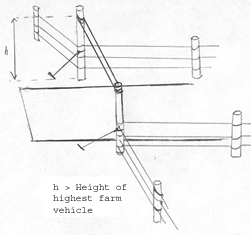
Droppers should be wired in every 3/4 - 1 1/2 meters. They stiffen the fence, prevent animals from forcing the wires apart, and ensure that the wires don't loosen over time. Droppers are easy to replace, so use easily available poles or sawn saplings. If you have the money, thin metal poles can take the place of some of the droppers. Tarred poles are a waste of money if used for droppers.
The method for attaching a dropper to a wire is shown below. If possible the droppers should be placed on alternating sides of the wires.
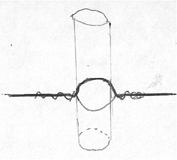
How Many Wires
Unless you are trying to fence in game animals, farm fences only need to be just over 1m high to prevent livestock escaping.
If you have cows, then the top wire should be barbed, because cows can quickly take the tension out of a fence by scratching their necks on a smooth top wire.
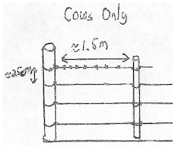
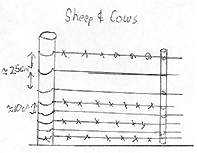
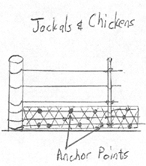
The wires of the fence can be about 20cm apart, but if you have sheep or small animals then the bottom 1/2 meter should have barbed strands about 10cm apart.
If jackals are a problem, or if you wish to keep chickens out of a field, you can add a layer of chicken wire to the bottom of the fence. If you use chicken wire you should run a taut strand as close to the ground as possible, to anchor the chicken wire, and also attach the chicken wire to the strand above it securely, to prevent animals pushing it down.
Barbed Wire
Barbed wire is unpleasant to work with, and so should be avoided unless you need it.
It is needed for the top strand if you have cows, and for half of the lower strands if you have sheep. For all other purposes normal wire works as well, and is much less likely to cause cuts and slashes. Without accessible medical treatment, an infected cut can be serious.
Fire can destroy a fence. It degalvanises the wire and burns the wood. All fences should be kept clear of bushes, trees and dead wood.
Walls
If you have the time and the manpower, a well-constructed stone wall is a solid barrier that requires almost no maintenance. There are stone walls in England that have been there for centuries, and are still a solid barrier to sheep and other livestock.
The amount of labor required makes these impractical for most people, but if you are clearing stones out of a field, it makes sense to pile them up, and it would be worthwhile to build the stones into walls should you have the time at a later stage.
Walls provide solid cover to anyone behind them, so it might not be advisable to have long rows of walls coming close to your farmhouse, for security reasons.
Kingpin
All materials at this site not otherwise credited are Copyright (c) 1996-2002 Trip Williams. All rights reserved. May be reproduced for personal use only. Use of any material contained herein is subject to stated terms or written permission.